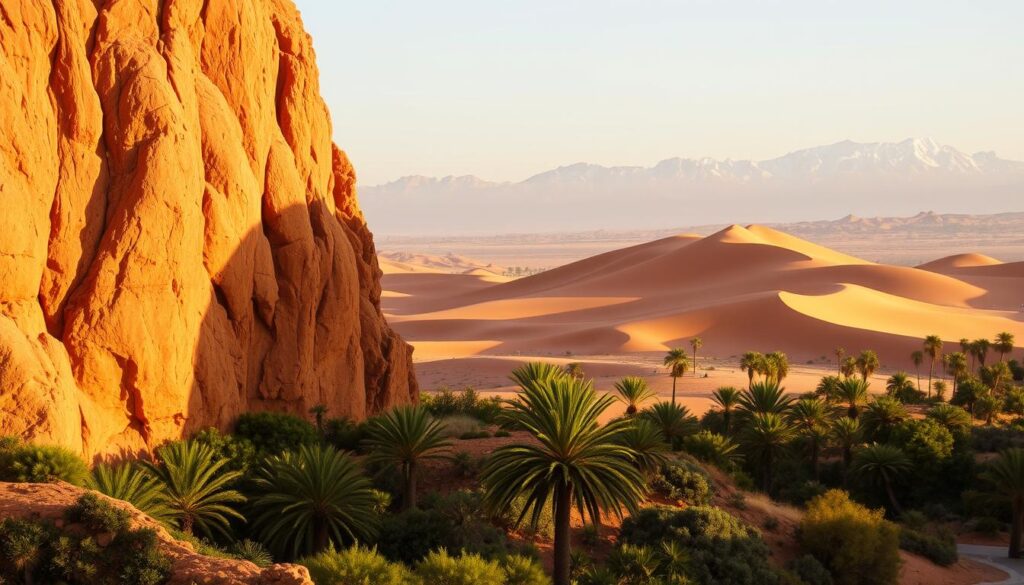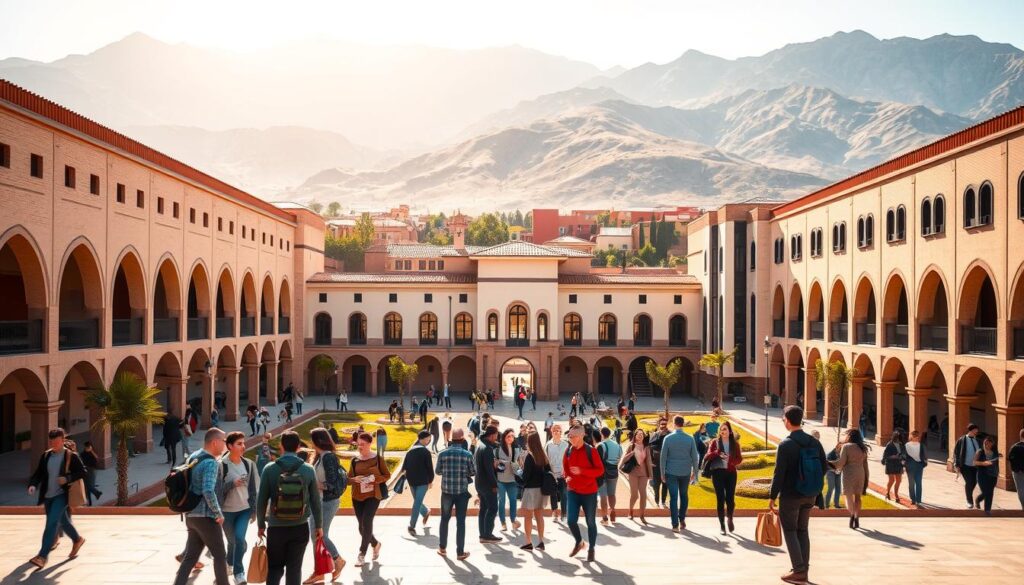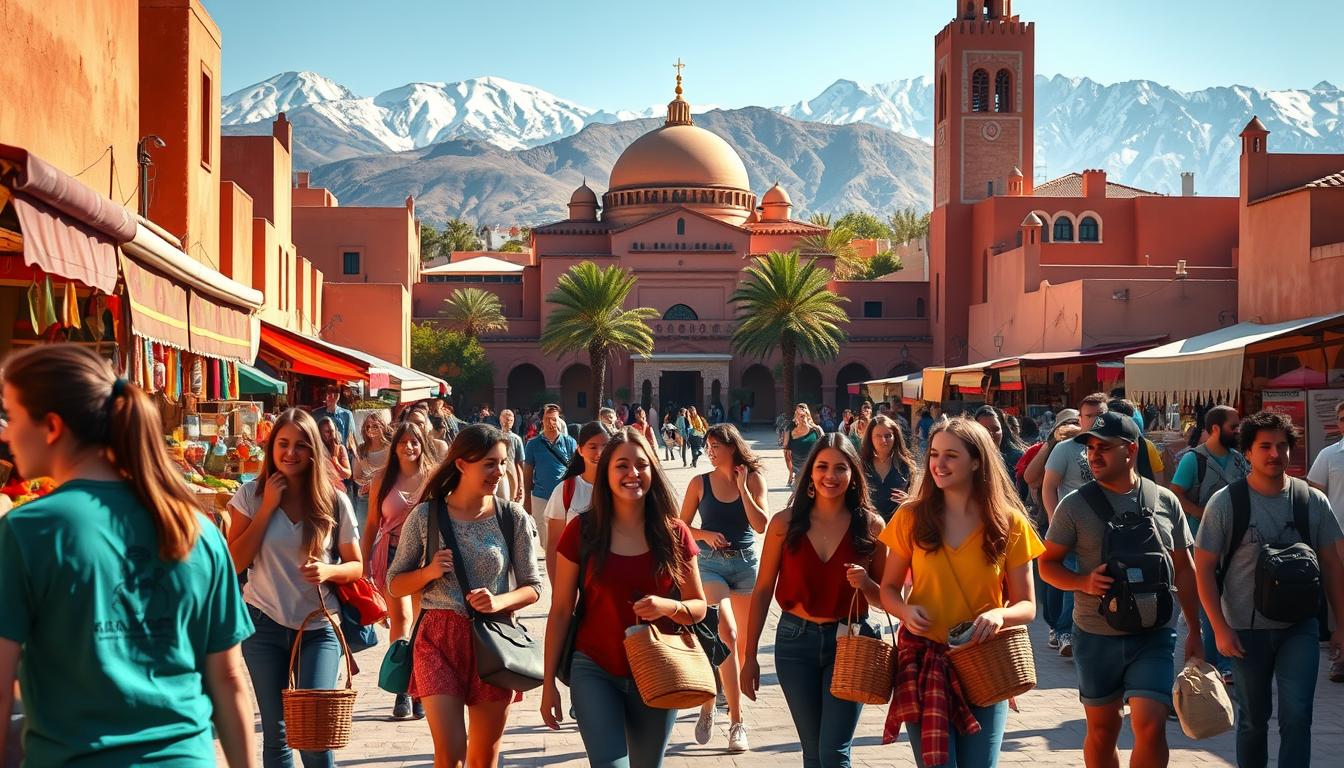What makes Morocco an ideal destination for student trips?
Imagine a land where vibrant markets, ancient history, and breathtaking landscapes converge to create an unforgettable adventure. For students, Morocco offers a unique blend of cultural immersion and educational exploration.
From the bustling streets of Marrakech to the serene dunes of the Sahara, Morocco is a destination that captivates and inspires. As part of educational travel Morocco programs, students can engage with local communities, explore historical sites, and develop valuable life skills.
Key Takeaways
- Morocco offers a diverse cultural and historical experience for students.
- Educational travel programs in Morocco foster personal growth and academic enrichment.
- Students can explore vibrant cities, historical landmarks, and natural wonders.
- Morocco’s unique blend of cultures provides a rich learning environment.
- Traveling to Morocco can be a transformative experience for young travelers.
The Enchanting Appeal of Morocco for Students
The enchanting appeal of Morocco for students lies in its diverse landscapes, historical landmarks, and the opportunity for cultural immersion. Morocco offers a unique blend of traditional and modern experiences that cater to the interests of students from various backgrounds.
A Blend of Culture, History, and Adventure
Morocco is a country that seamlessly blends culture, history, and adventure, making it an ideal destination for student travel Morocco. From the bustling streets of Marrakech to the serene landscapes of the Sahara Desert, students can experience a wide range of activities and environments. The country’s rich cultural heritage is evident in its architecture, cuisine, and traditional practices, providing a unique opportunity for Morocco cultural immersion.
Educational Value Beyond the Classroom
The educational value of traveling to Morocco extends far beyond the classroom. Students can engage in hands-on learning experiences, such as language classes, cultural workshops, and historical site visits. These activities not only enhance their knowledge but also foster personal growth and independence.
| Activity | Educational Benefit | Cultural Significance |
|---|---|---|
| Language Classes | Improves language skills | Enhances cultural understanding |
| Cultural Workshops | Provides hands-on cultural experience | Fosters appreciation for local traditions |
| Historical Site Visits | Enhances historical knowledge | Offers insights into Morocco’s past |
What Makes Morocco an Ideal Destination for Student Trips?
With its diverse landscapes, rich history, and vibrant culture, Morocco offers an unparalleled educational experience for students. This North African country is increasingly becoming a top choice for student trips due to its unique blend of traditional and modern elements.
Affordability Meets Enrichment
Morocco stands out for its affordability, making it an attractive destination for student groups on a budget. The cost of accommodations, food, and activities is relatively low compared to many other international destinations. Despite its affordability, Morocco is rich in educational opportunities, offering a wide range of cultural, historical, and environmental learning experiences.
Affordability Highlights:
- Low-cost accommodations ranging from traditional riads to modern hotels
- Affordable and diverse local cuisine
- Free or low-cost access to many historical and cultural sites
Accessibility and Safety Considerations
Morocco is generally considered safe for tourists, including student groups. The country has a well-developed tourism infrastructure, making it easy for visitors to travel around. Major cities like Marrakech, Fez, and Rabat are well-connected by public transportation, and many Moroccans in the tourism industry speak English, facilitating communication for international visitors.
Year-round Learning Opportunities
Morocco’s diverse climate and geography mean that there are learning opportunities available throughout the year. From exploring the Sahara Desert in the cooler months to studying the flora and fauna of the Atlas Mountains in the spring, students can engage in a variety of educational activities regardless of the season.
| Season | Learning Opportunities |
|---|---|
| Spring | Explore the flora and fauna of the Atlas Mountains, visit blooming valleys |
| Summer | Engage in coastal studies along the Atlantic coast, participate in cultural festivals |
| Autumn | Visit historic sites without the peak season crowds, enjoy harvest festivals |
| Winter | Explore the Sahara Desert, experience the unique winter landscapes |
Cultural Immersion Opportunities in Morocco
Cultural immersion in Morocco is a transformative experience that combines language learning, homestays, and participation in traditional ceremonies. This multifaceted approach allows students to gain a deeper understanding of Moroccan culture and society.
Language Exchange and Cultural Programs
Morocco hosts various language exchange programs that pair students with local peers, facilitating language practice and cultural exchange. These programs are designed to improve language skills while providing insights into daily Moroccan life.
Key benefits of language exchange programs include:
- Improved language proficiency through practical application
- Cultural insights gained from interacting with local peers
- Development of cross-cultural communication skills
Living with Local Families
Living with local families, or homestays, offers students a unique opportunity to experience Moroccan culture firsthand. Homestays provide a supportive environment where students can practice their language skills and participate in family activities.
A typical homestay experience includes:
| Activity | Description |
|---|---|
| Sharing meals | Enjoying traditional Moroccan cuisine with the host family |
| Participating in family activities | Engaging in daily routines and cultural practices |
| Language practice | Conversing with family members in Arabic or French |
Participating in Traditional Ceremonies
Participating in traditional Moroccan ceremonies, such as weddings or festivals, provides students with a unique cultural experience. These events offer a glimpse into Morocco’s rich cultural heritage and are invaluable for cultural immersion.
Benefits of participating in traditional ceremonies include:
- Gaining a deeper understanding of Moroccan customs and traditions
- Experiencing the vibrant cultural atmosphere of Morocco
- Forming lasting connections with the local community
Historical Treasures and Educational Sites
Morocco’s historical treasures and educational sites provide a comprehensive learning experience that goes beyond textbooks. The country’s rich history is reflected in its diverse landscapes and architectural heritage.
Ancient Medinas and Their Stories
The ancient medinas of Morocco, such as those in Fez and Marrakech, are living museums that offer insights into the country’s past. These historic cities are filled with narrow streets, bustling markets, and architectural marvels.
Exploring the medinas allows students to experience the sights, sounds, and smells of a bygone era.
Roman Ruins and Archaeological Sites
Morocco is also home to significant Roman ruins and archaeological sites, such as Volubilis, a UNESCO World Heritage Site. These sites provide a tangible link to the country’s Roman past.
Museums and Cultural Centers
Museums and cultural centers in Morocco offer a wealth of information about the country’s history and culture. The Bahia Palace in Marrakech and the Archaeological Museum in Rabat are notable examples.
Interactive Learning Experiences
Many of Morocco’s historical sites offer interactive learning experiences, including guided tours and hands-on activities. These experiences help bring history to life for students.
| Historical Site | Location | Educational Value |
|---|---|---|
| Volubilis | Meknes Region | Roman History and Architecture |
| Fez Medina | Fez | Medieval Islamic Culture |
| Bahia Palace | Marrakech | Craftsmanship and Islamic Art |
Moroccan Cities Every Student Should Experience
From the vibrant streets of Marrakech to the historic medinas of Fez, Morocco’s cities are a treasure trove of experiences for students. Each city offers a unique blend of culture, history, and modernity that caters to diverse interests and educational needs.
Marrakech: The Red City’s Vibrant Energy
Marrakech is known for its vibrant energy and rich cultural heritage. Students can explore the bustling souks, visit historic landmarks like the Koutoubia Mosque, and experience the city’s dynamic atmosphere. The city’s unique blend of traditional and modern elements makes it an ideal location for cultural immersion.
Fez: Medieval Learning and Craftsmanship
Fez, with its well-preserved medieval architecture, offers students a glimpse into Morocco’s rich past. The ancient medina, a UNESCO World Heritage site, is a living museum where students can learn about traditional craftsmanship and medieval learning.
Casablanca: Modern Morocco
Casablanca represents modern Morocco, with its contemporary architecture, bustling economy, and cultural institutions. Students can visit the iconic Hassan II Mosque, explore the city’s vibrant arts scene, and gain insights into Morocco’s economic development.
Chefchaouen: The Blue Pearl
Chefchaouen, known as the Blue Pearl, is a picturesque town nestled in the Rif Mountains. Its relaxed atmosphere and stunning natural beauty make it an ideal destination for students looking to experience rural Morocco.
Rabat: The Educational Capital
Rabat, the capital city, is a hub of educational institutions and historical sites. Students can visit the Mohammed V University, explore the Roman ruins of Chellah, and experience the city’s blend of history and modernity.
Each of these cities provides a unique educational experience, offering students a comprehensive understanding of Morocco’s diverse cultural, historical, and modern landscapes.
Natural Wonders for Outdoor Learning
The natural beauty of Morocco provides an unparalleled opportunity for students to engage in hands-on learning experiences. Morocco’s diverse landscapes, ranging from mountains to deserts and coastlines, offer a unique outdoor classroom.

Atlas Mountains: Geology and Ecosystems
The Atlas Mountains are a fascinating destination for students to learn about geology and ecosystems. The range offers opportunities to explore diverse flora and fauna, understand mountain formation, and study the local ecosystems.
Sahara Desert Experiences
The Sahara Desert is another significant natural wonder in Morocco, providing a unique setting for learning about desert ecosystems, astronomy, and the challenges faced by desert communities.
Coastal Studies Along the Atlantic and Mediterranean
Morocco’s extensive coastlines along the Atlantic Ocean and the Mediterranean Sea offer students the chance to study marine biology, coastal erosion, and the impact of human activities on marine ecosystems.
Environmental Conservation Projects
Students can participate in various environmental conservation projects, such as reforestation efforts in the Atlas Mountains or beach cleanups along the coast. These activities promote practical learning about environmental stewardship.
Culinary Experiences and Food Culture
Exploring Moroccan cuisine is a sensory journey that combines history, culture, and geography in a deliciously educational experience. Moroccan food is a rich tapestry of African, Arab, and Mediterranean flavors, making it an ideal subject for culinary exploration.
Cooking Classes and Food Markets
Students can immerse themselves in Moroccan cuisine through cooking classes where they learn to prepare traditional dishes like tagines and couscous. Visits to bustling food markets, or souks, provide a firsthand look at the vibrant colors and aromas of fresh produce, spices, and local delicacies.
Regional Specialties and Dining Etiquette
Morocco’s diverse regions offer a variety of specialties, from the seafood-rich dishes of the coast to the hearty stews of the Atlas Mountains. Understanding regional dining etiquette is also crucial, as mealtimes in Morocco are often seen as opportunities to build relationships and foster community.
Agricultural Tours and Sustainability
Agricultural tours provide insights into Morocco’s food systems, highlighting sustainable practices and the importance of local produce. This hands-on learning experience teaches students about the connection between agriculture, culture, and cuisine.
Practical Considerations for Student Groups
When planning a student trip to Morocco, several practical considerations must be taken into account to ensure a smooth and enjoyable experience. Student groups need to be well-prepared to handle the unique challenges and opportunities that Morocco presents.
Budgeting and Cost Management
Effective budgeting is crucial for a successful student trip. This includes planning for transportation, accommodation, food, and activities. Student groups should research affordable options and consider budgeting tools or apps to track expenses.
Transportation Options Within Morocco
Morocco offers various transportation options, including trains, buses, and taxis. Student groups can use the ONCF train network for efficient travel between major cities. For shorter distances, buses and taxis are readily available.
Accommodation Choices for Student Groups
From budget-friendly riads to modern hotels, Morocco offers a range of accommodation options suitable for student groups. It’s advisable to book in advance, especially during peak travel seasons.
Health and Safety Protocols
Ensuring the health and safety of student groups is paramount. This includes having a comprehensive health insurance plan and being aware of local emergency services.
Emergency Resources and Support
Student groups should have access to emergency resources, including contact information for local authorities and their country’s embassy. It’s also beneficial to have a basic first-aid kit and knowledge of local healthcare facilities.
Academic Programs and Study Opportunities
Students traveling to Morocco can engage in a multitude of enriching academic experiences that go beyond traditional classroom learning. The country’s unique blend of cultural heritage and modern educational institutions makes it an ideal destination for students seeking diverse study opportunities.
University Partnerships and Exchange Programs
Morocco hosts several universities that have established partnerships with international institutions, offering students the chance to participate in exchange programs. These partnerships facilitate academic exchange and research collaboration, enabling students to gain a more comprehensive understanding of their field of study.
Field Research Possibilities
The diverse geography and rich cultural landscape of Morocco provide a fertile ground for field research in various disciplines, including anthropology, archaeology, and environmental science. Students can explore historical sites, ecosystems, and cultural practices firsthand.

Language Learning Immersion
Morocco is an excellent location for language immersion programs, particularly for Arabic, French, and Berber languages. Students can engage in language classes and cultural activities to enhance their linguistic skills and gain a deeper understanding of the local culture.
Service Learning and Volunteer Opportunities
Students can also participate in service learning and volunteer programs, contributing to community development projects and gaining valuable practical experience. These opportunities foster personal growth and social responsibility.
Best Times for Student Visits to Morocco
The ideal time for students to visit Morocco depends on various factors, including weather and cultural events. Understanding these elements can help in planning a trip that is both enjoyable and enriching.
Seasonal Considerations and Weather Patterns
Morocco’s climate varies significantly from north to south and from the coast to the interior. The coastal regions tend to be mild, while the interior can be quite hot during the summer months. Key weather considerations include:
- Mild winters in the north, ideal for city tours and historical site visits
- Hot summers in the interior, suitable for desert adventures
- Spring and autumn as optimal seasons for outdoor activities and trekking
Festival Calendar and Cultural Events
Morocco is known for its vibrant cultural festivals, which can provide unique learning experiences for students. Some notable events include:
- The Marrakech International Film Festival, showcasing Moroccan and international cinema
- The Fez Festival of World Sacred Music, highlighting cultural diversity through music
- The Essaouira Gnawa Music Festival, celebrating Gnawa culture and music
These events offer insights into Moroccan culture and are valuable for students interested in cultural immersion.
Academic Calendar Alignment
For educational trips, aligning the visit with the academic calendar is crucial. This includes considering:
- University schedules and breaks
- Availability of academic programs and field studies
Planning around these factors ensures that the trip complements the students’ academic pursuits.
Navigating Cultural Differences: Tips for American Students
Cultural differences can often pose a challenge for American students traveling to Morocco, but with the right guidance, they can navigate these differences with ease. Understanding and respecting local customs and practices is crucial for a meaningful and enriching experience.
Religious Customs and Respect
Morocco is an Islamic country, and respecting religious customs is essential. American students should be aware of the importance of Ramadan, the holy month of fasting, and be considerate of their hosts and the local community during this period.
Dress Codes and Social Etiquette
Dressing modestly is advised, particularly when visiting religious sites or rural areas. Understanding local dress codes can help American students avoid unintended offense and blend in with the local culture.
Communication and Interaction Guidelines
Effective communication in Morocco involves more than just language; it’s also about understanding non-verbal cues and social norms. Being open-minded and patient can significantly enhance interactions with locals.
Responsible Tourism Practices
Engaging in responsible tourism practices not only benefits the local community but also enriches the travel experience. American students can make a positive impact by supporting local businesses and respecting the environment.
| Cultural Tip | Description | Benefit |
|---|---|---|
| Respect Ramadan | Be considerate during the fasting month | Shows respect for local customs |
| Dress Modestly | Avoid revealing clothing | Blends in with local culture |
| Learn Local Greetings | Use basic Arabic greetings | Enhances interaction with locals |
Conclusion: Creating Lifelong Memories in Morocco
Morocco is a destination that captivates the hearts of students, offering a rich tapestry of cultural, historical, and natural experiences. From the vibrant streets of Marrakech to the serene landscapes of the Sahara Desert, Morocco provides a unique backdrop for student trips that foster lifelong memories.
The blend of traditional and modern elements in Moroccan cities, the opportunity to engage with local communities, and the chance to explore ancient historical sites all contribute to an enriching experience. Students can immerse themselves in the local culture, learn about the country’s complex history, and develop a deeper understanding of the world.
As students explore Morocco’s diverse landscapes, from the Atlas Mountains to the Atlantic coast, they can participate in outdoor learning experiences that complement their academic pursuits. The memories created during these trips can last a lifetime, shaping their perspectives and influencing their future endeavors.
In Morocco student trips, students find more than just a travel experience; they discover a journey of personal growth and educational enrichment that leaves a lasting impression, creating lifelong memories in the process.
FAQ
What are the visa requirements for American students traveling to Morocco?
American students can stay in Morocco for up to 90 days without a visa. However, it’s essential to ensure your passport is valid for at least six months beyond your planned departure date.
How can student groups ensure their safety while traveling in Morocco?
Student groups should stay informed about local conditions, respect local customs, and stay together when exploring. It’s also recommended to hire local guides or use reputable tour operators.
What vaccinations are required for travel to Morocco?
The Centers for Disease Control and Prevention (CDC) recommends that travelers to Morocco be up to date on all routine vaccinations. Additionally, hepatitis A and typhoid vaccinations are recommended.
Can students participate in homestay programs in Morocco?
Yes, many organizations offer homestay programs in Morocco, allowing students to live with local families and immerse themselves in the culture.
What are the best ways for students to get around Morocco?
Students can use a variety of transportation options, including trains, buses, and taxis. Renting a car or hiring a driver for the day can also be convenient.
Are there opportunities for students to learn Arabic or French in Morocco?
Yes, many language schools in Morocco offer courses in Arabic and French, and some universities have language programs specifically designed for international students.
What kind of cultural events and festivals can students experience in Morocco?
Morocco hosts various cultural events and festivals throughout the year, such as the Marrakech International Film Festival and the Fez Festival of World Sacred Music.
How can students be respectful of Moroccan customs and traditions?
Students should dress modestly, respect Ramadan, and be mindful of local customs and etiquette. It’s also essential to learn a few basic phrases in Arabic or French.
Are there opportunities for students to participate in volunteer work or community service in Morocco?
Yes, many organizations offer volunteer opportunities for students in Morocco, including conservation projects, teaching, and community development initiatives.
What are the most important items to pack for a trip to Morocco?
Students should pack comfortable clothing, sunscreen, a hat, and layers for cooler evenings. It’s also a good idea to bring a power adapter and a portable charger.

